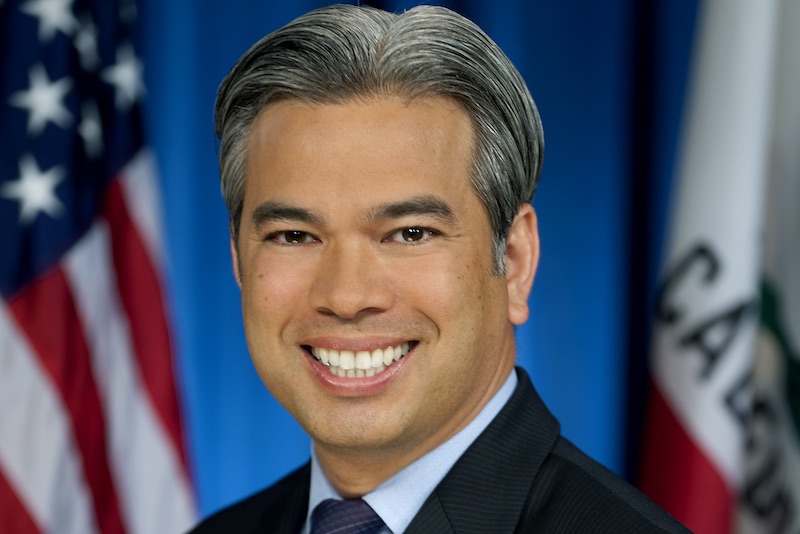
California has added five more Republican-led states to the list of places where state-funded travel is banned because of laws that discriminate against members of the LGBTQ community.
Speaking at a news conference on Monday, California Attorney General Rob Bonta (D) said that Florida, Arkansas, Montana, North Dakota, and West Virginia were being added to the list of states where government employee travel is forbidden, except under limited circumstances.
The addition of the five latest states brings the total number to 17, comprising more than one-third of all U.S. states.
“When states discriminate against LGBTQ+ Americans, California law requires our office to take action. These new additions to the state-funded travel restrictions list are about exactly that,” Bonta said in prepared remarks.
“Rather than focusing on solving real issues, some politicians think it’s in their best interest to demonize trans youth and block life-saving care. Make no mistake: We’re in the midst of an unprecedented wave of bigotry and discrimination in this country — and the State of California is not going to support it,” Bonta said, according to NPR.
Decrying a spate of new laws prohibiting transgender youth from participating in sports based on their gender identity, denying them access to restrooms or locker rooms aligning with their gender identity, or denying access to gender-affirming medical care, Bonta said that California “must take action to avoid supporting or financing discrimination against lesbian, gay, bisexual, and transgender people.”
He also criticized state lawmakers pushing these laws for choosing to “demonize trans youth” rather than focus on “solving real issues like tackling gun violence beating back this pandemic and rebuilding our economy.”
“There are political consultants in the Republican Party on the right who have decided that they think it might be a winning political issue to target trans youth,” said State Sen. Scott Wiener (D-San Francisco), who appeared alongside Bonta during the news conference.
“And when you think about it, what kind of person wakes up in the morning and when they are thinking about, when they’re brushing their teeth and figuring out, ‘What am I going to do today?’ [thinks] ‘I’m going to target children. I’m gonna make it harder for children to play sports. I’m gonna make it harder for children to get health care. I’m gonna make it harder for children to use the restroom. I’m gonna tell children they are not who they say they are, that they are just faking it to try and get some manipulative advantage.’ It’s outrageous. These children who are just trying to be who they are and live their lives,” Wiener added.
See also: Texas governor promises to sign ban on transgender athletes in women’s sports into law
In 2016, California lawmakers banned non-essential travel to states that adopted laws discriminating against LGBTQ people, beginning with North Carolina after it adopted its anti-transgender HB 2 “bathroom bill” law.
The other states that were added to the list prior to Monday included: Texas, Alabama, Idaho, Iowa, Oklahoma, South Carolina, South Dakota, Kentucky, Kansas, Mississippi, and Tennessee.
The actions that Bonta cited as justification for the addition of Florida, Montana, Arkansas, and West Virginia to the list were recently passed laws preventing transgender middle school, high school, and collegiate student-athletes from competing in school-sponsored sports consistent with their gender identity.
North Dakota was added after Gov. Doug Burgum (R) signed into law a bill allowing publicly-funded student organizations to restrict LGBTQ students from joining without losing funding.
In addition, Arkansas has passed the first law in the nation prohibiting medical professionals from providing gender-affirming health care treatments to transgender minors, even if they have their parents’ permission to pursue a gender transition or their primary medical provider has deemed the treatment to be medically necessary.
Montana has also passed a law imposing a requirement that any transgender person seeking to amend the gender or name on their birth certificate to undergo gender confirmation surgery before such a request can be granted, and another law prohibiting the government or any state agency from imposing regulations that “substantially burden” a person’s religious beliefs, which critics say could give a green light to instances of anti-LGBTQ discrimination.
The travel ban has some exemptions for certain trips, such as those needed to enforce California law, or to honor contracts signed before states were added to the list. Travel to conferences or out-of-state trainings are examples of trips that can be banned.
At the collegiate level, sports teams have resorted to using private funds to continue traveling to athletic competitions held in states on the list.
Last year, Texas sued California and asked the U.S. Supreme Court to block the law that created the list of banned states. The Lone Star State had argued that that the travel ban was “born of religious animus” and violates the Constitution.
In the lawsuit, Texas Attorney General Ken Paxton (R) argued that allowing the travel ban to stand would simply lead conservative and liberal states to ratchet up the culture wars by retaliating against each other for laws either side finds objectionable. But California argued that it had a right to state how its tax dollars are spent, and that taxpayer dollars should not be used to fund discrimination.
In April, the Supreme Court declined to hear the case, declining to give a reason for its refusal. Associate Justices Clarence Thomas and Samuel Alito dissented, saying they would have allowed the case to be argued before the high court.
Bolstering Paxton’s argument about an escalating culture war among states, Oklahoma Gov. Kevin Stitt (R) retaliated against California for adding Oklahoma to its travel ban list last year. Citing California’s support of abortion access as justification, Stitt issued an executive order prohibiting all non-essential travel to the Golden State, accusing it of trying to “politically threaten and intimidate Oklahomans for their personal values.”
Assemblymember Evan Low (D-Campbell), the chair of the California Legislative LGBTQ Caucus, argued that the latest additions to the list are necessary to send a “strong message” to states that pass laws, and to state workers that they will not be required to travel to states passing laws hostile to the LGBTQ community.
“The current culture war is not a game,” Low said in a statement. “This is a fight in which our opponents are motivated by fear and hate, even though the LGBTQ+ community has always been about love and inclusion. So as these states choose to regress to the toxic legacies of the past, I’m here to say that California will always move forward, and we will continue to support LGBTQ+ people everywhere. We won’t go back into the closet, and we will not stay silent. And California will never reward states that act in bad faith.”
See also:
NFL says “football is gay” after Carl Nassib comes out
Marjorie Taylor Greene says LGBTQ-inclusive school curriculums are ‘child abuse’
Scottish train company slaps down homophobe who complained about ‘Pride train’








